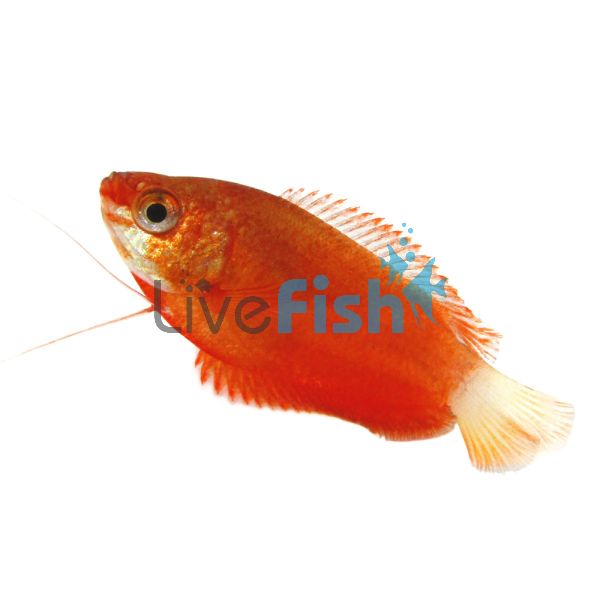Orange Flame (Red Honey) Gourami 4cm
The deep orange colouration of the orange flame gourami is a true spectacle, it’s a unique colour that isn’t seen in a lot of aquarium fish. Though reds and oranges are a common colour in many aquarium fish, they don’t seem to hit the same level of depth as this adorable little gourami. These orange gouramis are a newer colour variant of the beloved sunset honey gourami. They remain small making them great beginner tropical fish and are a fantastic addition to a community aquarium.
- Buy 5 for $11.79 each and save 10%
- Buy 10 for $10.48 each and save 20%
Orange Flame (Red Honey) Gourami
The deep orange colouration of the orange flame gourami is a true spectacle, it’s a unique colour that isn’t seen in a lot of aquarium fish. Though reds and oranges are a common colour in many aquarium fish, they don’t seem to hit the same level of depth as this adorable little gourami. These orange gouramis are a newer colour variant of the beloved sunset honey gourami. They remain small making them great beginner tropical fish and are a fantastic addition to a community aquarium.
The orange flame gourami has an intense orange to red gradient from head to tail. Their vibrancy makes this fish contrast so well no matter the aquarium setting which is why these fish is quickly rising in popularity. To add some variation to this red, the gourami also has platinum white cheek plates and sometimes near the tail. Under bright led aquarium lights with an increased red spectrum, these orange flame gouramis glow and the flame in their name comes out. They also work perfectly in a painted tank to add a burst of color against the green.
Breeding the orange flame gourami is possible and is often quite easy. When kept in a group, these fish should naturally pair off where males will build a bubble nest to entice females for spawning. In a mixed community aquarium, it is highly unlikely that there will be any success in rearing fry so it is best to have a dedicated breeding aquarium. There are no immediate distinguishing factors between males and females which is why it is best to start with a small group. When mature though, it is often said that females tend to be a lighter colour and rounder when compared to males.
Tank Recommendations for your Orange Flame Gourami
Being a fish, which grows to only 5 cm and remains very easy to care for, the orange flame gourami can be kept in a fairly small aquarium with the minimum being 30 liters. These fish are great mid to top-water dwelling fish so the choice of substrate and hardscape is not a massive consideration. The orange flame gourami will also enjoy a well-planted tank and being kept against a dark substrate will make these fish pop.
Suitable Tank Buddies
The orange flame Molly is a small and peaceful fish. They can get along with a wide range of community aquarium tank mates as long as none of the species are fin nippers or large and boisterous.
Usually Compatible
Corydoras, swordtails, opaline gourami, danios, neon tetras, and a range of smaller community aquarium fish.
Sometimes Compatible
Betta, Apistogramma, and any species which may confuse the orange flame gourami as a competitor in its territory. Species like Apistogramma Cacatuoides can confuse the bright orange gourami as a better-looking competitor and show aggression.
Rarely Compatible
Large and aggressive species could outcompete or predate the orange flame gourami.
Feeding your Orange Flame Gourami
The orange flame gourami is very easy to feed once it is settled into the aquarium. It will readily eat a wide range of foods but would prefer to have high a floating nano pellet or flake due to their top dwelling behavior. Giving them nutritional food with good protein will ensure optimal health.
| Scientific Name | Trichogaster Trichopterus |
|---|---|
| Care Level | Easy |
| Common Names | Orange Flame Gourami, Red Honey Gourami, Red sunset gourami. |
| Diet | Omnivore |
| Fish Family | Osphronemidae |
| Lifespan (years) | 5 |
| Max. Length (cm) | 5 |
| Min. Tank Volume (l) | 30 Liters |
| Origin | Asia |
| Reef Safe | Yes |
| Sociability | Peaceful |
| Venomous | No |
| Water Conditions | 24-26° C, pH 6.0-7.0 |
-
0Can i get a specific gender on the gouramis if its not separately displayed?Read Detail
 Submited by: Incognito
Submited by: Incognito
 19 Jul 2024
19 Jul 2024
-
We cannot 100% guarantee the gender as it will depend on the type of fish, size and what is available at the time of packing the order. However, we will make a note on the order for the dispatch team and they will do their very best to fill the request.Answered by Admin on 07 Jan 2025
-
- 1




